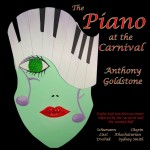Cello Concertos: Sir Edward Elgar & Elliott Carter; Kol Nidrei (Bruch)
DECCA 478 2735: TPT: 62’23”
…………………………………
Behzod Abduraimov (piano)
Liszt; Saint Saens; Prokofiev
DECCA 478 3301: TPT: 72’45”
………………………………………….
ALLELUIA
Julia Lezhneva (soprano)
Il Giardino Armonico: Giovanni Antonini
Vivaldi; Handel; Porpora;Mozart
DECCA 478 5242: TPT: 60’48”
reviewed by Neville Cohn
Unlike, say, Mozart, Schubert and Chopin who died tragically young, Verdi was firing on all pistons into his eighties when he wrote Falstaff – and Sibelius muddled drunkenly on into his nineties without having written anything of substance for years. But very few composers indeed have kept going well over the century mark as well as composing at a significant level. The remarkable Elliott Carter is a case in point. The US musician remained creative almost until his recent death at the age of 103. In, fact, between his 90th and 100th birthdays, he maintained a creative pace that many a composer decades younger would have had difficulty emulating, let alone exceeding.
In passing: imagine what Mozart might have produced if he’d lived another month – another week, for that matter: another symphony, perhaps, or a piano concerto. The same might be said of Schubert and Chopin. The tragic brevity of their lives on earth constitutes a massive loss to the world.
The long-lived Carter wrote his Cello Concerto when in his nineties. It’s played here by Alisa Weilerstein with the Staatskapelle Berlin conducted by Daniel Barenboim.
Like so much that Carter wrote, his concerto positively brims with intriguing ideas. There’s not a dull moment in his ever-changing sonic landscape and Weilerstein and Barenboim do it proud, seeming positively to relish coming to grips with its abundance of resourceful and engaging detail. It positively brims with novelty; it really warrants a good few listenings to respond to its multitude of musical thoughts.
I dare say that for many, the chief attraction of this recording would be Elgar’s Cello Concerto. That it is conducted by Barenboim adds a poignant dimension to the performance as the famous recording of the work with his cellist wife Jacqueline du Pre has assumed almost mythical status in the wake of the latter’s tragically lingering illness – MS – and death at far too young an age.
Weilerstein is a worthy soloist. The cello’s opening statement throbs with passion, the solo line gripping the attention from first note to last as the work’s evolving emotional landscape draws the listener ineluctably into Elgar’s unique and unforgettable sound and mood world. Throughout, Barenboim secures splendid responses from the Berlin Staatskapelle which provides a first rate accompaniment for the cello line. There’s much that gives pleasure, too, in Bruch’s Kol Nidrei, his fantasia on the melody traditionally sung on the eve of the Jewish Day of Atonement. It’s a faultless offering at every level, its more introverted moments coming across with aching poignancy.
Another young musician reaching out for – and touching – the stars is Behzod Abraimov in a debut recording that ought to win him many admirers. He is sometimes compared to the legendary Horowitz – and his account of Saint Saens’ Danse Macabre is presented with the sizzling virtuosity and the sort of stylistic flair and diamond-bright tone that were so significant a factor in Horowitz’s playing. Here, Abraimov draws the listener effortlessly into the music’s eerie, phantasmagoric world .
There’s much that gives pleasure, too, in Prokofiev’s massive Sonata No 6 with its bracing attack and follow-through and unerring sense of the composer’s idiosyncratic style. It has a confidence and brio that augur well for a stellar career.
A reading of Liszt’s Benediction de Dieu dans la solitude is less uniformly persuasive with the pianist taking up an interpretative position some little distance from the emotional epicentre of the music. The music’s mood of serene introspection was not always persuasively evoked. But there is compensation aplenty in Abduraimov’s reading of Liszt’s Mephisto Waltz No 1 which comes across with blazing intensity that calls to mind the astonishing virtuosity which can be heard in Julius Katchen’s celebrated DECCA LP recording from the early 1960s. Abduraimov’s staying power is impressive with much of the playing the epitome of intensity and drive.
A debut DECCA recording by soprano Julia Lezhneva falls into that rare category in which the singing seems not so much a learned, studied skill but rather an act of such naturalness, such spontaneity, apparently free of the slightest strain, so entirely in tune (no pun intended) with the genre, so altogether satisfying as to be beyond criticism in the conventional sense. Of course, for playing to leave an impression of such freedom and freshness can, paradoxically, only be the fruit of the most concentrated self-discipline. This is music making at the most august level. Bravissimo!




